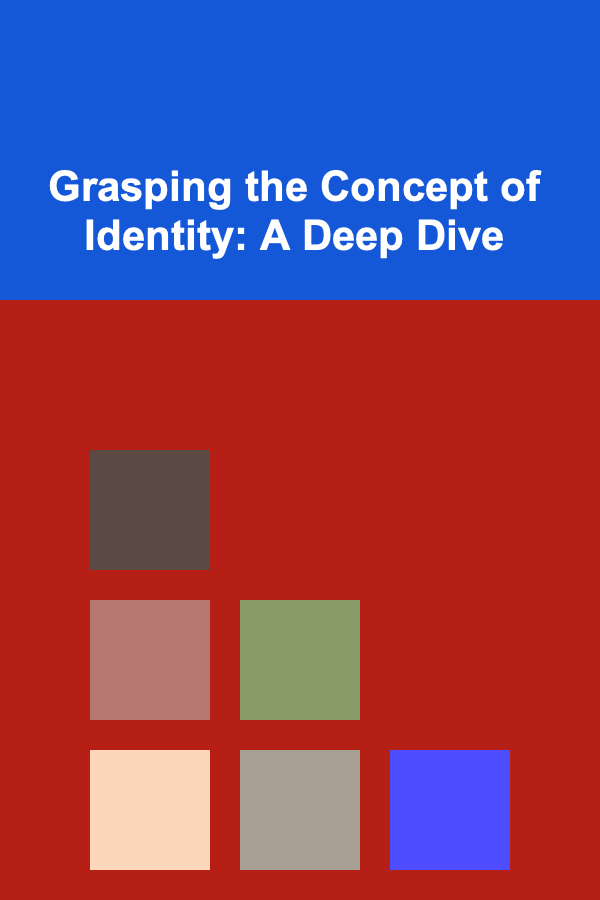
Grasping the Concept of Identity: A Deep Dive
ebook include PDF & Audio bundle (Micro Guide)
$12.99$8.99
Limited Time Offer! Order within the next:

Identity, a term often bandied about in philosophical discussions, psychological analyses, and sociological studies, is far from a monolithic or easily definable concept. It's a multifaceted construct shaped by a complex interplay of internal and external forces. To truly grasp identity, we must delve into its various dimensions, explore its formation, and understand its profound impact on our lives and interactions.
Defining the Elusive: What is Identity?
At its core, identity is the understanding and acceptance of oneself as a distinct individual or group, differentiated from others. It answers the fundamental question, "Who am I?" or "Who are we?". However, the simplicity of this question belies the complexity of its answer. Identity isn't a static label; it's a dynamic and evolving narrative, constantly being shaped and reshaped by our experiences, relationships, and the social contexts in which we exist. It's a process of self-definition that never truly ends.
Several key aspects contribute to a comprehensive understanding of identity:
- Self-Concept: This is the sum total of our beliefs and ideas about ourselves. It includes our perceived strengths, weaknesses, values, and roles. Our self-concept is formed through introspection, interactions with others, and interpretations of our experiences. A healthy self-concept allows for both self-acceptance and a realistic understanding of one's capabilities and limitations.
- Social Identity: This refers to the aspects of our self-concept that derive from our membership in social groups or categories. These groups can be based on ethnicity, nationality, gender, religion, social class, occupation, or any other shared characteristic. Social identity provides a sense of belonging and can influence our behavior and attitudes. However, it can also lead to in-group bias and out-group discrimination if not critically examined.
- Personal Identity: This encompasses the unique and idiosyncratic characteristics that distinguish us from others, even within the same social groups. It includes our personality traits, personal values, unique experiences, and individual aspirations. Personal identity emphasizes our individuality and contributes to our sense of self-worth.
- Narrative Identity: This is the story we tell ourselves about our lives, integrating our past, present, and future aspirations into a coherent whole. It's the narrative framework we use to make sense of our experiences and give meaning to our lives. Narrative identity is not a fixed and immutable record of events; it's a constructed narrative that is constantly being revised and reinterpreted as we grow and change.
The Formation of Identity: A Lifelong Journey
Identity formation is not a sudden event, but rather a gradual and continuous process that unfolds throughout our lives. While certain periods, such as adolescence and young adulthood, are often considered critical for identity development, the process continues well into adulthood and even old age.
Early Influences: Family and Childhood
Our earliest experiences within the family environment lay the foundation for our developing sense of self. The values, beliefs, and attitudes transmitted by our parents and caregivers significantly shape our initial self-concept and worldview. The quality of our early attachment relationships also plays a crucial role. Secure attachment fosters a sense of trust and security, enabling us to explore our environment and develop a positive self-image. In contrast, insecure attachment can lead to feelings of anxiety, insecurity, and difficulty forming healthy relationships later in life.
Childhood experiences outside the family, such as interactions with peers and exposure to different cultural influences, also contribute to identity formation. Through these interactions, we learn about social norms, expectations, and different perspectives. We begin to experiment with different roles and identities, trying on different "selves" to see what fits.
Adolescence: The Identity Crisis
Adolescence is often characterized as a period of "identity crisis," as described by Erik Erikson. During this stage, individuals are faced with the task of integrating their past experiences, present aspirations, and future goals into a coherent sense of self. They explore different roles, values, and beliefs, often questioning the assumptions and expectations that were instilled in them during childhood. This exploration can be a challenging and confusing process, but it is essential for developing a mature and integrated identity.
Erikson identified several possible outcomes of the identity crisis:
- Identity Achievement: Individuals who have successfully navigated the identity crisis and have made firm commitments to their values, beliefs, and future goals. They have a strong sense of self and are able to articulate their identity clearly.
- Identity Foreclosure: Individuals who have made commitments without exploring alternatives. They often adopt the values and beliefs of their parents or other authority figures without questioning them. While they may have a clear sense of identity, it is not based on their own exploration and choices.
- Identity Moratorium: Individuals who are actively exploring different options but have not yet made any commitments. They are in a state of experimentation and uncertainty, trying on different roles and values to see what fits.
- Identity Diffusion: Individuals who have not explored different options and have not made any commitments. They lack a clear sense of self and may feel confused and directionless.
It's important to note that these are not fixed categories, and individuals can move between them throughout their lives. Moreover, the identity crisis is not necessarily a negative experience. It can be a catalyst for growth and self-discovery, leading to a more authentic and fulfilling life.
Adulthood and Beyond: Continued Evolution
Identity formation doesn't end with adolescence. As we move into adulthood, we continue to refine and evolve our sense of self in response to new experiences, relationships, and challenges. Career choices, marriage, parenthood, and significant life events can all profoundly impact our identity. We may revisit our values, beliefs, and goals, and make significant changes to our lifestyle and priorities.
Furthermore, as we age, our identity may become increasingly shaped by our roles and responsibilities. We may identify ourselves as parents, professionals, caregivers, or members of specific communities. These roles can provide a sense of purpose and belonging, but they can also be a source of stress and conflict if they are not aligned with our values and aspirations.
Even in old age, identity continues to evolve. As we face the challenges of aging, such as physical decline, loss of loved ones, and retirement, we may need to redefine our sense of self and find new sources of meaning and purpose. Reflecting on our life experiences and sharing our stories with others can be a powerful way to maintain a sense of identity and continuity in the face of these challenges.
The Influence of Social and Cultural Context
Identity is not formed in a vacuum. It is profoundly influenced by the social and cultural contexts in which we live. Our culture provides us with a framework for understanding the world, shaping our values, beliefs, and expectations. It also influences the roles and identities that are available to us. For example, gender roles, ethnic identities, and social class distinctions are all culturally constructed and can significantly impact our sense of self.
Social interactions also play a crucial role in identity formation. Through our interactions with others, we receive feedback about ourselves, which can either reinforce or challenge our self-concept. We also learn about social norms and expectations, and we adjust our behavior accordingly. The groups to which we belong provide us with a sense of belonging and validation, and they can also influence our attitudes and beliefs.
However, social and cultural influences can also be a source of conflict and tension. We may feel pressure to conform to societal expectations, even if they conflict with our personal values and aspirations. We may also face discrimination and prejudice based on our social identities. Navigating these challenges requires critical self-reflection and a willingness to challenge social norms and expectations.
The Impact of Intersectionality
It is crucial to acknowledge the concept of intersectionality when discussing identity. Intersectionality recognizes that individuals possess multiple intersecting identities, such as race, gender, class, sexual orientation, and ability, which interact to shape their experiences and perspectives. These identities are not simply additive; they create unique and complex combinations that influence how individuals are perceived and treated by society. For example, a Black woman may experience discrimination differently than a white woman or a Black man, due to the intersection of her race and gender.
Understanding intersectionality is essential for developing a nuanced and inclusive understanding of identity. It allows us to recognize the diverse experiences and perspectives of individuals from different backgrounds and to address the systemic inequalities that arise from the intersection of multiple forms of oppression.
Navigating Identity: Challenges and Opportunities
The process of identity formation is not always smooth and straightforward. Individuals may face various challenges along the way, such as:
- Identity Confusion: A lack of clarity about one's values, beliefs, and goals, leading to feelings of uncertainty and anxiety.
- Identity Crisis: A period of intense exploration and questioning, often accompanied by feelings of stress and confusion.
- Role Conflict: Conflicting expectations associated with different roles and identities, leading to feelings of stress and overwhelm.
- Marginalization: Feeling excluded or alienated from mainstream society due to one's social identities.
- Internalized Oppression: Internalizing negative stereotypes and beliefs about one's own social group, leading to feelings of self-doubt and low self-esteem.
However, these challenges can also be opportunities for growth and self-discovery. By confronting these challenges, individuals can develop a stronger sense of self and a greater understanding of their place in the world. They can also learn to challenge oppressive systems and advocate for social justice.
Here are some strategies for navigating the complexities of identity:
- Self-Reflection: Take time to reflect on your values, beliefs, and goals. Ask yourself what is important to you and what you want to achieve in life.
- Exploration: Experiment with different roles, activities, and relationships. Try new things and step outside of your comfort zone.
- Social Support: Seek out support from friends, family, or mentors. Connect with others who share your values and beliefs.
- Critical Thinking: Challenge social norms and expectations. Question the assumptions that you have been taught.
- Self-Acceptance: Accept yourself for who you are, including your strengths and weaknesses. Embrace your unique qualities and celebrate your individuality.
- Embrace Intersectionality: Acknowledge and understand the multiple dimensions of your identity and how they influence your experiences and perspectives. Be mindful of the intersectional identities of others and strive to create inclusive spaces that respect and value diversity.
The Importance of a Strong Sense of Identity
A strong and well-defined sense of identity is crucial for psychological well-being and personal fulfillment. It provides us with a sense of purpose and direction in life, enabling us to make meaningful choices and pursue our goals with confidence. It also fosters resilience, allowing us to cope with challenges and setbacks more effectively.
Individuals with a strong sense of identity are more likely to:
- Have higher self-esteem and self-confidence.
- Experience greater life satisfaction.
- Form healthy relationships.
- Make ethical decisions.
- Contribute to their communities.
Conversely, individuals with a weak or confused sense of identity are more likely to experience anxiety, depression, and other mental health problems. They may struggle to make decisions, form meaningful relationships, and find purpose in life.
Conclusion: Embracing the Fluidity of Identity
Grasping the concept of identity requires understanding that it is not a fixed entity but a fluid and ever-evolving process. It is shaped by a complex interplay of internal and external forces, and it is constantly being redefined by our experiences, relationships, and the social contexts in which we live. By embracing the fluidity of identity, we can develop a more nuanced and compassionate understanding of ourselves and others. We can learn to appreciate the diversity of human experience and to create a more inclusive and equitable world for all.
Ultimately, the journey of identity formation is a lifelong adventure. It requires self-reflection, exploration, and a willingness to challenge our assumptions and beliefs. By embracing this journey, we can discover our authentic selves and live more meaningful and fulfilling lives.

How to Keep Your Home's Gutters Clean and Flowing
Read More
How to Make the Most of Limited Trunk Space
Read More
How to Make Your Staircase Stand Out with Festive Decorations
Read More
How to Set Up a Homework Station in Your Child's Room
Read More
Navigating the World as a Travel Agent: Tips, Tricks, and Tales from the Frontline
Read More
The Data Scientist's Handbook: Unlocking the Power of Data for Business Insights
Read MoreOther Products

How to Keep Your Home's Gutters Clean and Flowing
Read More
How to Make the Most of Limited Trunk Space
Read More
How to Make Your Staircase Stand Out with Festive Decorations
Read More
How to Set Up a Homework Station in Your Child's Room
Read More
Navigating the World as a Travel Agent: Tips, Tricks, and Tales from the Frontline
Read More